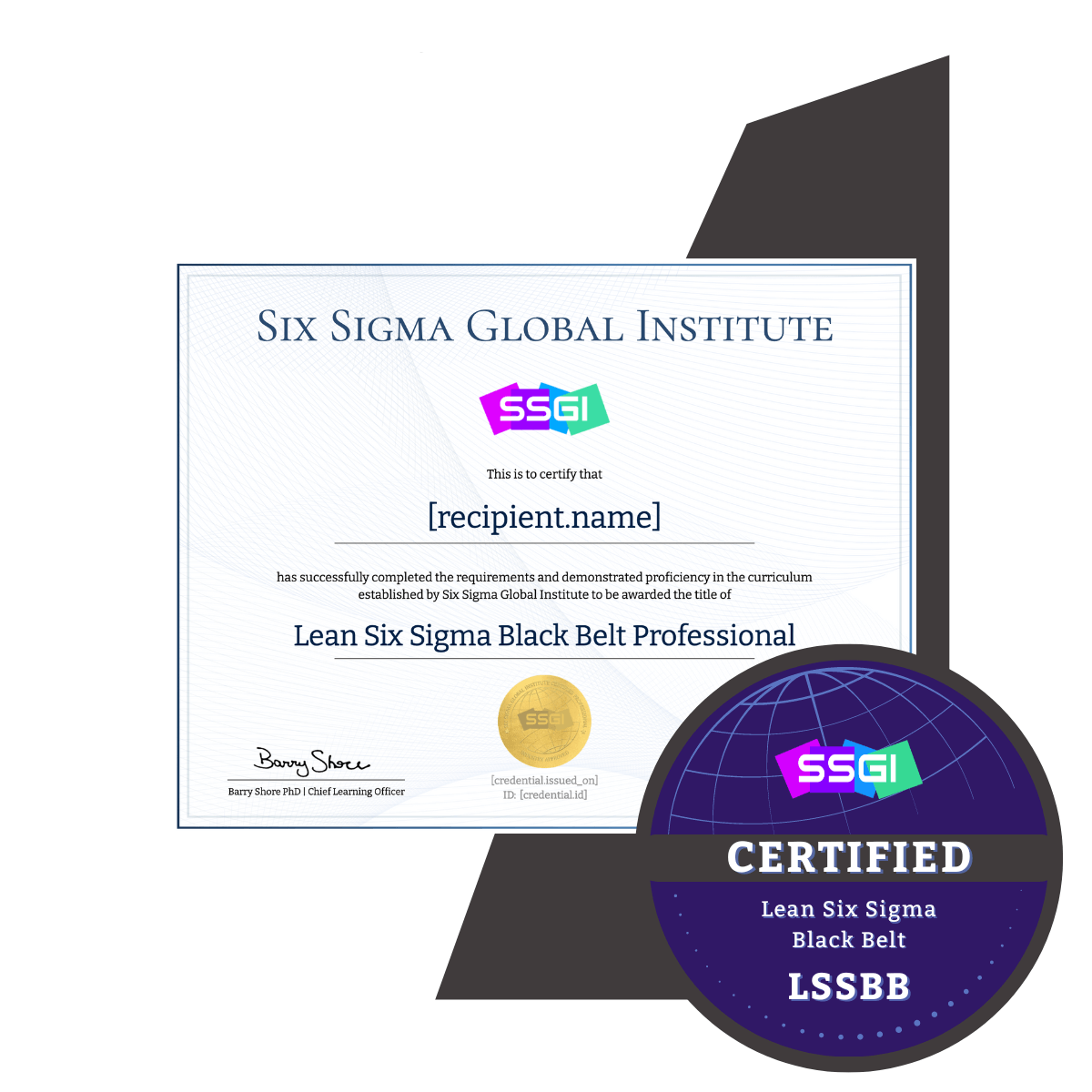What Are the Key Benefits of a Six Sigma Black Belt Certification?
The benefits of earning a Six Sigma Black Belt certification go far beyond adding a credential to your resume. Among the most sought-after Six Sigma Black Belt benefits is the ability to lead cross-functional projects that impact real business performance. This advanced-level certification equips professionals with the leadership skills, analytical tools, and strategic mindset needed to drive meaningful change within organizations.
Whether you’re aiming for a promotion, career transition, or greater impact in your current role, the Six Sigma Black Belt certification benefits include:
Increased salary potential, often 10–25% higher than non-certified peers
Leadership opportunities, including roles in quality, operations, and project management
Expertise in solving complex problems using data-driven methodologies like DMAIC
Ability to lead high-impact projects that reduce costs, improve processes, and enhance customer satisfaction
Recognition by top employers across industries — including tech, healthcare, manufacturing, and finance
The Black Belt is more than just a certification, it’s a launchpad to senior-level roles, consulting opportunities, and long-term career growth. It signals to employers that you’re ready to lead, influence, and deliver measurable results.

Industry Acclaimed Consulting Expert & Master Black Belt, Prof. Emeritus University of New Hampshire, Co-Founder SSGI
At SSGI, our Lean Six Sigma Black Belt Certification is developed by Dr. Barry Shore, a McGraw-Hill award-winning professor with over 40 years of experience. The program is trusted by Fortune 500 companies, hospitals, and government agencies across the U.S.

🔟 Top Benefits of Earning a Six Sigma Black Belt Certification
The top benefits of earning a Six Sigma Black Belt certification go beyond just adding a credential to your resume. Black Belts are trained leaders in process improvement, equipped with advanced tools to drive efficiency, reduce costs, and lead strategic initiatives. Whether you’re aiming to step into a leadership role, increase your earning potential, or gain recognition across industries, a Black Belt certification offers a proven path to career growth and operational impact. Below, we break down the ten most powerful advantages of becoming a certified Lean Six Sigma Black Belt.
1. Career Advancement Into Leadership Roles
Certified Black Belts are trusted to lead critical initiatives in process improvement. The certification opens doors to management, director-level, and executive roles across industries, including healthcare, manufacturing, and tech.
2. Significantly Higher Salary Potential
According to data from Glassdoor and Payscale, Black Belts typically earn between $90,000–$130,000+ annually. This credential positions you as a high-value asset capable of boosting profits and reducing operational costs.
3. Mastery of Operational Efficiency
You’ll learn how to reduce defects, minimize variation, and streamline processes — core competencies in Lean Six Sigma that drive measurable results.
4. Strategic Project Management Expertise
Black Belts lead high-impact projects. You’ll master tools such as DMAIC, root cause analysis, and stakeholder communication, giving you the skills to drive initiatives from planning to execution.
5. Global Recognition and Professional Credibility
A Six Sigma Black Belt certification is respected around the world. It tells employers that you have the knowledge and expertise to solve complex problems and lead with data-driven strategy.
6. Advanced Analytical and Problem-Solving Skills
You’ll be equipped with tools for data analysis, process diagnostics, and hypothesis testing. These are essential skills for decision-making in any high-level role.
7. Increased Job Security and Marketability
In times of economic uncertainty, companies prioritize professionals who can improve efficiency and reduce costs. Black Belts are among the most recession-resilient roles in operations and business improvement.
8. Versatility Across All Industries
Whether you work in:
🚑 Healthcare
🏛 Government
🛠 Engineering
💼 Corporate Strategy
🖥️ Technology
🛒 Retail
The demand for process improvement professionals is universal — and so is the value of a Black Belt.
9. Culture-Shaping Leadership
Black Belts don’t just lead projects — they shape culture. You’ll foster continuous improvement, empower teams, and lead sustainable change across departments and functions.
10. Measurable, Real-World Impact
As a Black Belt, you’ll learn how to generate quantifiable results — such as reducing errors by 40%, saving millions in operating costs, and improving customer satisfaction scores.
At SSGI, our Black Belts have delivered results for Fortune 500 companies, major hospital systems, and state governments.
Is Six Sigma Black Belt Certification Worth It?
Yes, if you’re aiming for leadership roles in operations, process improvement, or quality management, it’s one of the best investments you can make in your career. The skills, recognition, and impact you gain are second to none.
As one of the most respected credentials in business and industry, it gives professionals the tools to lead high-impact projects, reduce costs, and deliver measurable results.
Six Sigma Black Belts are equipped with advanced methodologies like DMAIC, team leadership skills, and data-driven problem-solving techniques. Whether you’re looking to climb into executive leadership or launch a consulting career, this certification positions you for long-term success.
Black Belt certification opens doors to high-paying, high-impact roles and sets you apart as a leader in operational excellence.

👤 Who Should Get a Black Belt Certification?
- ✅ Mid-career professionals looking to advance
- ✅ Green Belts ready to take the next step
- ✅ Team leaders in operations, quality, or strategy
- ✅ Business analysts, engineers, or consultants
- ✅ Operational Managers & Quality Professionals
💼 Common Job Titles for Black Bels
- 🔹 Lean Six Sigma Project Manager
- 🔹 Process Improvement Leader
- 🔹 Operations Manager
- 🔹 Director of Continuous Improvement
- 🔹 Business Analyst
- 🔹 Quality Manager
- 🔹 Senior Consultant
Who Should Get a Black Belt Certification?
A Lean Six Sigma Black Belt certification is designed for professionals seeking to elevate their careers, take on leadership roles, and become experts in operational excellence. Black Belt-certified individuals are trained to lead complex projects, manage cross-functional teams, and deliver measurable improvements across organizations. If you’re currently working in operations, quality management, project leadership, or data analysis, a Black Belt can help you take the next major step in your professional journey. It’s also an ideal certification for consultants or professionals aiming to bring Lean Six Sigma practices into healthcare, government, manufacturing, and corporate environments.
Whether you’re looking to stand out in a competitive job market or gain the tools to drive lasting change in your organization, this certification equips you with the skills, credibility, and confidence to lead.
Six Sigma Black Belt Salary Insights
Lean Six Sigma Black Belts are among the highest-paid professionals in quality and operations, according to industry data from Glassdoor and Payscale.
Estimated Ranges by Role (U.S.):
Process Improvement Manager: $90K–$110K
Quality Manager: $95K–$120K
Director of Operations: $110K–$140K
Continuous Improvement Consultant: $100K–$130K
These salaries reflect the ROI companies gain from your ability to reduce waste, boost efficiency, and lead cross-functional teams.


What Career Opportunities Can it Unlock?
A Six Sigma Black Belt can help you:
Step into leadership roles
Lead enterprise-wide transformation projects
Stand out in competitive job markets
Qualify for consulting roles or executive-level advancement
Transition between industries while maintaining credibility
How to Earn Your Black Belt Certification Online
With SSGI, you’ll earn your Lean Six Sigma Black Belt 100% online — at your own pace, with no deadlines or hidden fees.
Program Features:
Self-paced, 100% online
Developed by Dr. Barry Shore (40+ years experience)
Includes certification exam
No renewal fees
Trusted by 1,000+ organizations worldwide
Backed by the Baldrige Foundation
Aligned with PMI standards
🚀 Ready to Earn Your Lean Six Sigma Black Belt?
Join professionals from Tesla, Amazon, and the U.S. Department of Defense who have chosen SSGI’s expert-led, self-paced certification program.
Get Certified TodayTrusted by Leading Organizations for Black Belt Certification
Professionals from Tesla, Amazon, Maersk, and other industry leaders have earned their Lean Six Sigma Black Belt certification through SSGI’s expert-led, online programs.
Frequently Asked Questions About Six Sigma Black Belt Certification
If you’re considering earning your Lean Six Sigma Black Belt, you probably have a few questions. Below are answers to some of the most common inquiries about certification, training requirements, time commitment, and career impact.
What are the top Six Sigma Black Belt benefits?
The top Six Sigma Black Belt certification benefits include higher salary potential, expanded leadership opportunities, global recognition by employers, and the ability to lead high-impact, data-driven projects. Black Belts are often seen as strategic assets within organizations and are well-positioned for roles in operations, quality, and process improvement.
Is a Six Sigma Black Belt Certification recognized globally?
Yes. A Six Sigma Black Belt Certification is recognized and respected by employers worldwide across industries including healthcare, manufacturing, government, and tech. It’s a universal credential for process improvement professionals.
What background do I need to enroll into a Black Belt course?
Most programs recommend having a Green Belt or equivalent knowledge. At SSGI, you can enroll directly into the Black Belt program if you’re comfortable with process improvement concepts and basic statistics.
Is Six Sigma Black Belt Certification worth it?
Absolutely. Black Belts often see significant career growth, salary increases, and leadership opportunities. The ROI of a Six Sigma Black Belt is high, especially for professionals in operations, consulting, and quality management roles.
Can I get a Black Belt without a Green Belt
Yes. Many providers, including SSGI, allow professionals to go straight into the Black Belt program, especially if they have prior experience or knowledge in quality management or project leadership.
Do Six Sigma Black Belts need to recertify?
Not with SSGI. Our certifications never expire, and there are no renewal fees — once you’re certified, it’s yours for life.
What tools and skills will I learn in the Black Belt course?
You’ll master DMAIC methodology, statistical analysis (like regression and hypothesis testing), root cause analysis, project leadership, and tools such as Minitab and control charts.
What’s the difference between Lean Six Sigma and Six Sigma?
Lean Six Sigma combines Lean’s focus on speed and waste reduction with Six Sigma’s focus on quality and variation control. Most modern programs, including SSGI, teach Lean Six Sigma as the industry standard.
How much do Lean Six Sigma Black Belts make?
Salaries typically range from $95,000 to $130,000+ depending on location, industry, and experience level. Leadership roles and consulting positions often earn even more.
What’s the difference between a Green Belt and a Black Belt?
Green Belts support improvement projects, while Black Belts lead them. Black Belts go deeper into statistics, leadership, and cross-functional strategy.
Do I need to complete a project to get certified?
At SSGI, no project is required to get certified — but we encourage professionals to apply what they learn in real-world settings. In addition SSGI offers a full simulated project component. Many of our students work on active projects as they study.
How long does it take to complete a Black Belt certification?
Most professionals complete the Black Belt program in 3–6 weeks at their own pace. At SSGI, there are no time limits or deadlines.















